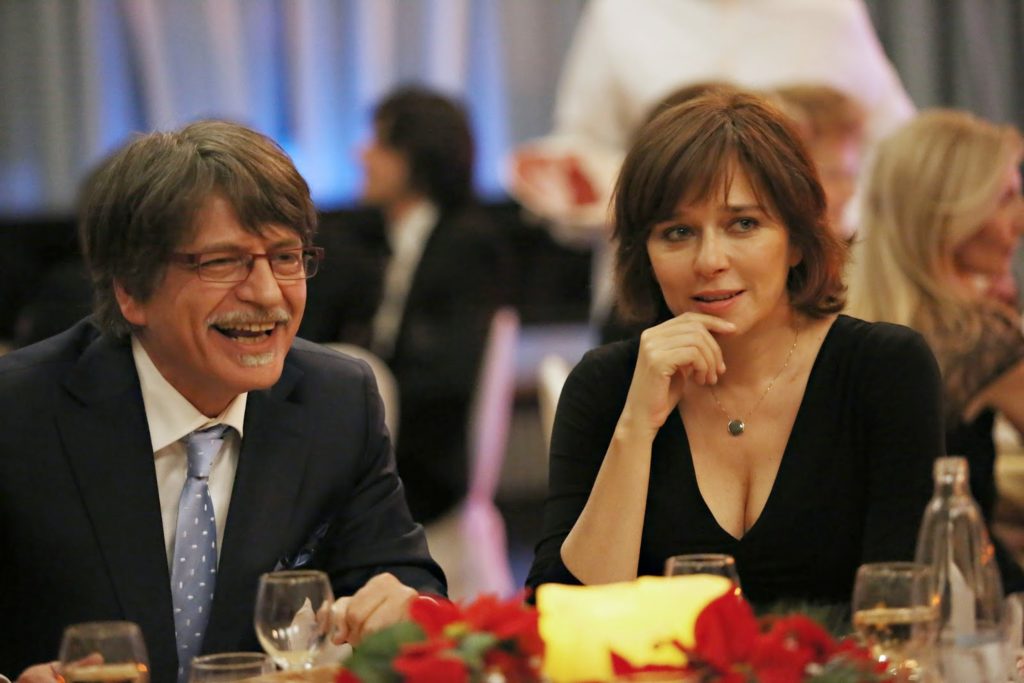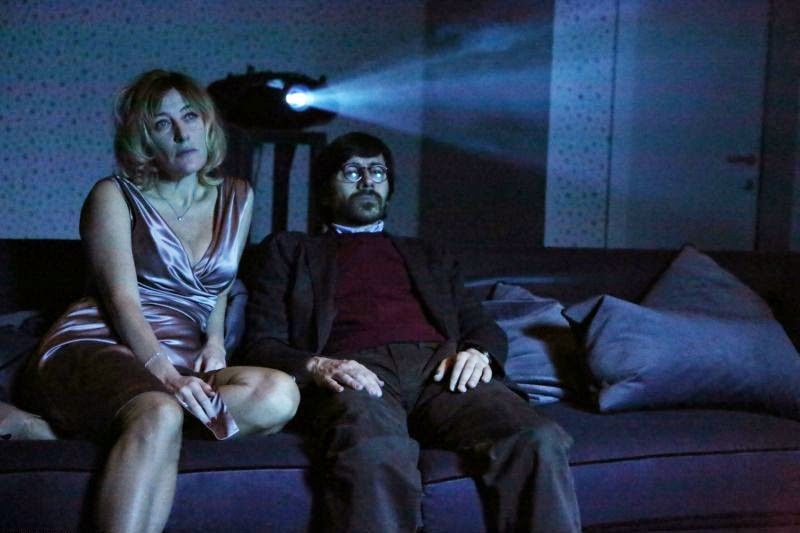How much is a human life worth? Apparently, it depends on the life. That would certainly be the embittered response of Human Capital, Paolo Virzi’s dark, disquieting drama of entitlement and despair. A jaundiced look at the intractable divisions between the careless haves and the dejected have-nots, it aspires to fuse caustic social criticism with old-fashioned melodrama. On the one hand, it is a polemic, a poisoned arrow aimed at the heart of the new world order; on the other, it is a whodunit, a crime mystery of slippery suspense. These are lofty twin goals, and it’s no surprise that Human Capital never quite realizes its potential on either front. But even if its reach exceeds its grasp, the movie is consistently engaging, with enough intriguing ideas and interesting storytelling to draw you into its crisscrossing web of human ugliness.
The movie opens with a fateful incident: After some waitstaff clean up the crumbs following a posh event, one of them glumly clambers onto his bicycle, pedals off toward home, and suddenly gets run off the road by a burly black SUV. From there, Human Capital flashes back six months and replays the events leading up to this hit-and-run from the perspectives of three different characters. The first is Dino (an excellent Fabrizio Bentivoglio), a middle-class real estate broker with a newly pregnant wife, Roberta (Valeria Golino—yes, that Valeria Golino, from Rain Man and Hot Shots!), and a teenage daughter, Serena (Matilde Gioli, very good). One sunny day, Dino drops Serena off at her boyfriend’s house—a palatial estate with its own clay tennis courts and indoor pool owned by Giovanni (Fabrizio Gifuni)—and, seduced by the opulence towering before him, decides to invest his life savings (and then some) in Giovanni’s “can’t-lose” hedge fund. The second main character is Giovanni’s wife, Carla (Valeria Bruni Tedeschi), a dilettantish former actress who hopes to use her husband’s bottomless cash flow to renovate a defunct local theater. And the third is Serena herself, a restless young woman who has grown disenchanted with Giovanni’s buffoonish son, Massimiliano (Guglielmo Pinelli), and finds herself drawn instead to Luca (Giovanni Anzaldo), an outcast with a sensitive soul and unstable temperament.
These are, needless to say, three very different people, with wide discrepancies in wealth, age, and social status. But Virzi’s screenplay, which he co-wrote with Francesco Bruni and Francesco Piccolo (adapting a novel by American author Stephen Amidon), weaves its protagonists together through the common threads of dissatisfaction and desire. They may want different things—Dino covets money, Carla craves purpose, Serena seeks only love—but they all want something. Human Capital explores the manner in which these three discontented individuals try to add meaning to their lives, even as it also attempts to keep us guessing as to its central mystery, namely, the identity of the driver who injured that poor, lonely cyclist. The police suspect Massimiliano and accuse Serena of covering for him, though her furtive behavior—as well as the laws of screenwriting—suggest that someone unexpected is culpable.
But that’s for later. First, we must bear witness to our trio’s hopeless struggles toward self-improvement, and none of Human Capital‘s characters is more hopeless than Dino. With his queasy laugh and pale-grey moustache, he is an absolute parasite, thrashing helplessly for the nearest host. He finds one in Giovanni, with whom he ingratiates himself thanks to his semi-pro background in tennis. He is so smitten with his new doubles partner’s creature comforts that he skillfully manipulates his banker into granting him a sizable loan—with his house as collateral (sure, it’s in Serena’s name, but of course that’s her signature, why even ask?)—then promptly plunks the proceeds down into the hedge fund. (When one of Giovanni’s lawyers dutifully informs him that the fund is illiquid and that he should anticipate some risk, Dino waves him off without a second thought.) It is hardly a spoiler to reveal that his investment does not perform as promised, but Human Capital generates friction not just from Dino’s pitiful predicament but from his impotent reaction. He is unfailingly obsequious even when despondent, and Bentivoglio’s performance brilliantly paints him as a squirrelly sycophant in way over his head.
Bentivoglio is so convincingly pathetic that the movie begins to sputter when it shifts away from Dino and toward Carla. Her inclusion in the story make good thematic sense, as otherwise Virzi would be guilty of tarring all of his wealthy characters with the same black brush. (To wit, consider the rest of Carla’s family: Giovanni is an amoral shyster, while Massimiliano is an idiotic pig.) But her sudden obsession with the theater feels less like a burning passion than a manufactured plot point, as does her dalliance with a sleazy, pompous professor.
Yet if Carla’s journey exposes the thinness of Human Capital‘s supporting characters, Serena’s confirms the richness of it leads. She is the movie’s lone sympathetic figure, and Gioli’s delicate and sensitive performance somehow packs a lifetime of suppressed longing into her handful of scenes. It’s fitting, then, that Serena’s storyline, suffused with sadness and anguish, concludes with a ray of hope that shines through the film’s abiding darkness. (Less fitting is Virzi’s inexplicable decision to undercut the gentle beauty of the film’s final shot with some numbingly redundant and expository title cards.)
Human Capital‘s tripartite structure—it repeatedly visits identical moments from different characters’ perspectives—could have felt trite, but Virzi demonstrates enough technique to prevent things from becoming stale. He makes good use of music, whether it’s a pop song blasting during one of those overlapping sequences that prevents it from feeling repetitive, or the unsettling use of Vivaldi’s “Four Seasons”. (On the latter count, he recalls Ruben Östlund’s Force Majeure.) And while he mostly employs a handheld camera for maximum intimacy, he delivers a few stylistic flourishes, such as a sex scene that’s backlit by figures from a classic film being projected in the background.
That’s a nervy scene, and Human Capital is a gratifyingly ambitious movie, even if it is not an entirely successful one. (The David di Donatello Awards, Italy’s equivalent of the Oscars, clearly disagreed, handing the film 19 nominations and seven trophies.) The resolution of its central mystery is a letdown—one that transpires only thanks to a clumsy plot contrivance—and its stinging attacks on the aristocracy aren’t as barbed as Virzi intends them to be. But despite the apparent artificiality of its structure and the one-dimensionality of its supporting characters, Human Capital is dependably entertaining, with strong lead performances and a satisfying sense of purpose. It wants you to feel thoroughly shaken, but you’ll have to settle with being agreeably stirred.
Jeremy Beck is the editor-in-chief of MovieManifesto. He watches more movies and television than he probably should.



